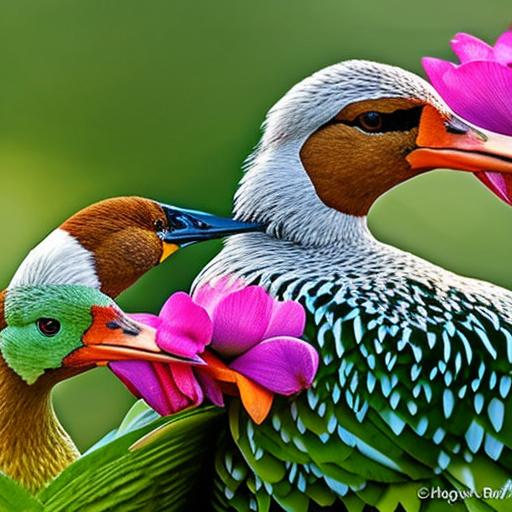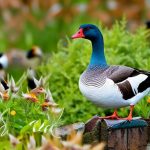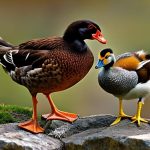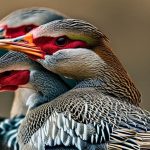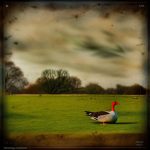Geese are beautiful creatures that can often be found in parks, lakes, and other natural habitats. However, when they venture into our gardens, they can cause significant damage. Geese are attracted to gardens because they provide a source of food and water, as well as a safe place to rest and nest. The problem of geese damaging gardens is a common one, and finding humane solutions is important to protect both our gardens and the geese themselves.
Key Takeaways
- Geese are social animals that mate for life and are protective of their young.
- Choose flowers that are not attractive to geese, such as those with strong scents or bitter tastes.
- Physical barriers like fences or netting can prevent geese from accessing your garden.
- Scare tactics like loud noises or visual deterrents like balloons can help keep geese away.
- Motion-activated sprinklers can startle geese and discourage them from returning to your garden.
Understanding the behavior of geese
In order to effectively deter geese from our gardens, it is important to understand their behavior. Geese are attracted to gardens because they offer a variety of food sources, including grass, flowers, and vegetables. They also provide a safe and comfortable environment for geese to rest and nest. When geese are in a garden, they tend to graze on the grass and eat any available flowers or vegetables. They may also leave behind droppings, which can be unsightly and unsanitary.
Choosing the right flowers for your garden
One way to deter geese from your garden is to choose flowers that are less attractive to them. Geese tend to target certain types of flowers, such as tulips, daffodils, and hostas. These flowers are often tender and succulent, making them a tasty treat for geese. However, there are many other types of flowers that geese are less likely to eat. Some examples include marigolds, lavender, and snapdragons. These flowers have a strong scent or taste that geese find unappealing.
Creating physical barriers to protect your flowers
Another effective way to keep geese away from your garden is to create physical barriers. Fencing is one option that can be used to keep geese out of your garden. A fence should be at least three feet high and made of a material that geese cannot easily climb or fly over. Netting can also be used to protect individual plants or flower beds. This can be especially useful for protecting delicate flowers or vegetables that geese are particularly attracted to.
Using scare tactics to deter geese
Scare tactics can be an effective way to deter geese from your garden. There are a variety of scare tactics that can be used, including noise makers and visual deterrents. Noise makers, such as wind chimes or bells, can startle geese and make them uncomfortable. Visual deterrents, such as scarecrows or reflective tape, can also be effective in keeping geese away. These deterrents create the illusion of a predator or danger, which can scare geese away.
Installing motion-activated sprinklers
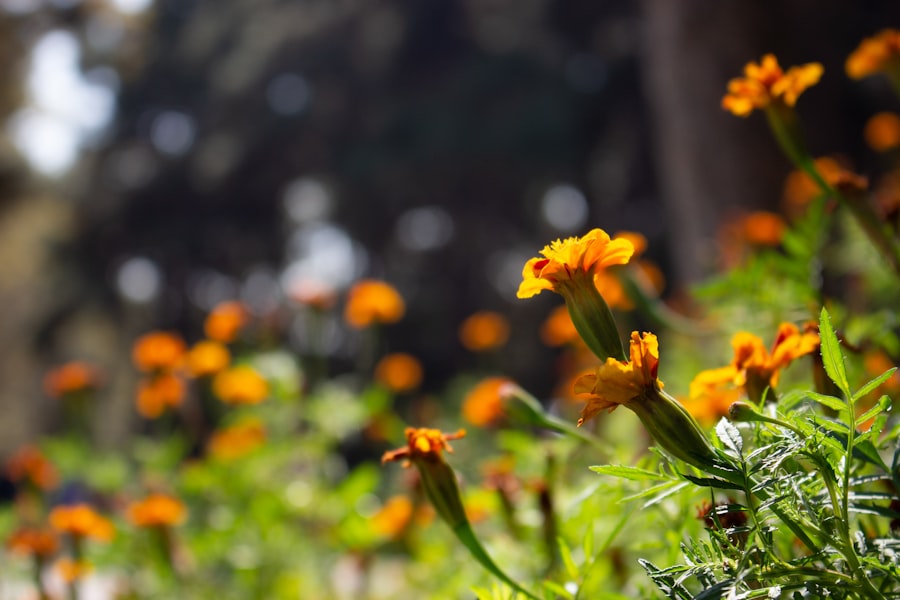
Motion-activated sprinklers are another effective solution for keeping geese away from your garden. These sprinklers are equipped with motion sensors that detect when a goose is approaching. When the sensor is triggered, the sprinkler releases a burst of water, scaring the goose away. This solution is effective because it combines both a visual and physical deterrent. The sudden burst of water surprises and startles the goose, making it uncomfortable and less likely to return.
Applying taste or scent repellents to your flowers
Taste or scent repellents can be applied to flowers to make them less appealing to geese. There are a variety of repellents available on the market that are specifically designed to deter geese. These repellents often have a strong odor or taste that geese find unpleasant. By applying these repellents to your flowers, you can make them less attractive to geese and discourage them from eating them.
Using decoys to trick geese
Decoys can be used to trick geese into thinking there are already other geese in the area. Geese are social animals and prefer to be in groups. By placing decoys, such as plastic geese or swans, in your garden, you can create the illusion of a larger flock. This can deter geese from entering your garden, as they may feel threatened or outnumbered.
Encouraging natural predators in your garden
Natural predators can be an effective way to keep geese away from your garden. Dogs, for example, are natural predators of geese and can be trained to chase them away. Hawks and other birds of prey are also natural predators of geese and can help keep them at bay. By encouraging these natural predators in your garden, you can create a natural deterrent for geese.
Providing alternative food sources for geese
One way to keep geese away from your garden is to provide alternative food sources for them. Geese are attracted to gardens because they offer a variety of food sources, including grass, flowers, and vegetables. By providing an alternative food source, such as a designated feeding area or a nearby pond with plenty of vegetation, you can redirect the geese away from your garden.
Seeking professional help if necessary
If all else fails, it may be necessary to seek professional help to deal with the problem of geese damaging your garden. A wildlife control expert can assess the situation and provide recommendations for humane solutions. They may also be able to implement more advanced techniques, such as habitat modification or relocation, to effectively deter geese from your garden.
In conclusion, finding humane solutions to the problem of geese damaging gardens is important for both our gardens and the geese themselves. By understanding the behavior of geese and implementing various deterrents, such as physical barriers, scare tactics, motion-activated sprinklers, taste or scent repellents, decoys, encouraging natural predators, providing alternative food sources, and seeking professional help if necessary, we can effectively keep geese away from our gardens. It is important to find a solution that works for you and your garden, while also being mindful of the well-being of the geese.
If you’re struggling with geese munching on your beautiful flowers, you might find this article on Poultry Wizard helpful. They provide valuable insights and tips on how to keep geese from eating your precious blooms. Additionally, Poultry Wizard offers a wealth of information on various poultry-related topics, such as setting up a garden chicken coop (source) and understanding the egg-laying habits of geese (source). Check out their website for more poultry wisdom!
FAQs
What are geese?
Geese are waterfowl birds that are commonly found in North America, Europe, and Asia. They are known for their distinctive honking sound and their V-shaped flying formation.
Why do geese eat flowers?
Geese are herbivores and they eat a variety of plants, including flowers. They may eat flowers because they are attracted to their bright colors and sweet scent.
What are the effects of geese eating flowers?
Geese eating flowers can have a negative impact on the aesthetics of a garden or landscape. It can also be harmful to the plants themselves, as geese may trample or uproot them while feeding.
How can I keep geese from eating my flowers?
There are several methods that can be used to deter geese from eating flowers, including installing physical barriers such as fences or netting, using repellents such as decoys or sound devices, and planting flowers that are less attractive to geese.
Are there any natural ways to keep geese away from flowers?
Yes, there are several natural methods that can be used to keep geese away from flowers, including planting natural deterrents such as garlic or chives, using reflective surfaces such as mirrors or CDs, and introducing natural predators such as dogs or hawks.
Is it legal to harm geese that are eating my flowers?
No, it is not legal to harm geese or any other wildlife. It is important to find humane and non-lethal methods to deter geese from eating flowers.
Meet Walter, the feathered-friend fanatic of Florida! Nestled in the sunshine state, Walter struts through life with his feathered companions, clucking his way to happiness. With a coop that’s fancier than a five-star hotel, he’s the Don Juan of the chicken world. When he’s not teaching his hens to do the cha-cha, you’ll find him in a heated debate with his prized rooster, Sir Clucks-a-Lot. Walter’s poultry passion is no yolk; he’s the sunny-side-up guy you never knew you needed in your flock of friends!

